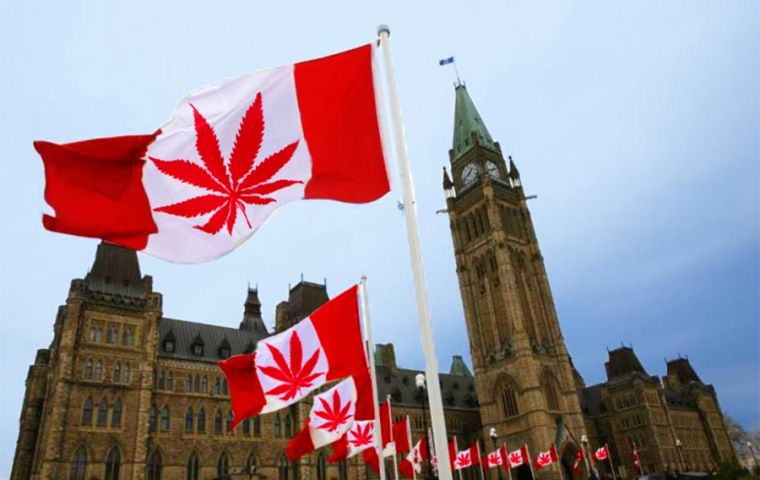MercoPress. South Atlantic News Agency
Canadian parliament approves recreational marihuana
 Legal sales are likely to begin before the end of the boreal summer after the Senate voted 52-29 on Tuesday night to approve the bill
Legal sales are likely to begin before the end of the boreal summer after the Senate voted 52-29 on Tuesday night to approve the bill  “We've just witnessed a historic vote for Canada. The end of 90 years of prohibition,” Sen. Tony Dean, one of the bill's sponsors said
“We've just witnessed a historic vote for Canada. The end of 90 years of prohibition,” Sen. Tony Dean, one of the bill's sponsors said  Ottawa said illegal marijuana “allowed criminals and organized crime to profit” adding, “in many cases, it is easier for our kids to buy cannabis than cigarettes”
Ottawa said illegal marijuana “allowed criminals and organized crime to profit” adding, “in many cases, it is easier for our kids to buy cannabis than cigarettes”  Those points were echoed by Liberal Prime Minister Justin Trudeau last fall, when he welcomed the news that the bill was making its way to the Senate.
Those points were echoed by Liberal Prime Minister Justin Trudeau last fall, when he welcomed the news that the bill was making its way to the Senate.Recreational marijuana may soon be legal in Canada, after both the House of Commons and the Senate approved the Cannabis Act. Legal sales are likely to begin before the end of the boreal summer after the Senate voted 52-29 on Tuesday night to approve the bill, CBC reported.
“We've just witnessed a historic vote for Canada. The end of 90 years of prohibition,” Sen. Tony Dean, one of the bill's sponsors, told the CBC. “Transformative social policy, I think. A brave move on the part of the government.”
Canada's minister of justice sponsored the cannabis bill; the government announced its push for legalization last spring with an official news release that stated, “The current approach to cannabis does not work.”
The government said that making marijuana illegal “has allowed criminals and organized crime to profit, while failing to keep cannabis out of the hands of Canadian youth.”
It added, “In many cases, it is easier for our kids to buy cannabis than cigarettes.”
Those points were echoed by Liberal Prime Minister Justin Trudeau last fall, when he welcomed the news that the bill was making its way to the Senate.
The proposed law would make it legal for anyone over the age of 18 to possess marijuana, provided that it is less than 30 grams (just over an ounce). It also allows Canadians to grow up to four marijuana plants in their home.
The bill's authors write that legalization would have several benefits, from protecting the health of young people (by restricting access) to undercutting criminal enterprises and reducing the workload of the criminal justice system. It would also allow for quality control and public health awareness campaigns.
But critics of the bill say that part of the reason they want to keep marijuana illegal is that they're not convinced that the government will be able to disrupt the marijuana black market to any substantial degree.
That was one point raised by Conservative Sen. Percy Mockler, who said on Monday that “the initiative suffers from a serious absence of policy analysis.”
Canada's government has also published the results of a cannabis survey, based on more than 9,000 responses from people across the country, ages 16 and up. In the survey, ”About half of all respondents indicated that cannabis had a positive effect on a person's mood (51%), creativity (45%), anxiety (50%), and sleep (49%),“ Canada's Health Ministry said.
The government also said ”77 percent of all survey respondents thought that using cannabis could be habit forming.”
Medical marijuana has been legal in Canada since the early 2000s. If it legalizes recreational use now, it would give the United States northern neighbor another competitive edge in what is widely seen as an emerging and lucrative industry.




Top Comments
Disclaimer & comment rules-

-

-

Read all commentsMeanwhile the regressive British government is only just considering allowing it for medical use after the bad publicity of them confiscating essential treatment from a child with epilepsy. Why are we so far behind?
Jun 20th, 2018 - 08:22 am 0And this is how canuckistan chooses to distinguish its self.
Jun 20th, 2018 - 10:05 pm 0The US isn't far behind; lots of states allow medical use and some have decriminalised possession all together. Legalising is better as long as they are successful in disrupting the illegal market, we know prohibition doesn't work.
Jun 21st, 2018 - 10:38 am 0Commenting for this story is now closed.
If you have a Facebook account, become a fan and comment on our Facebook Page!